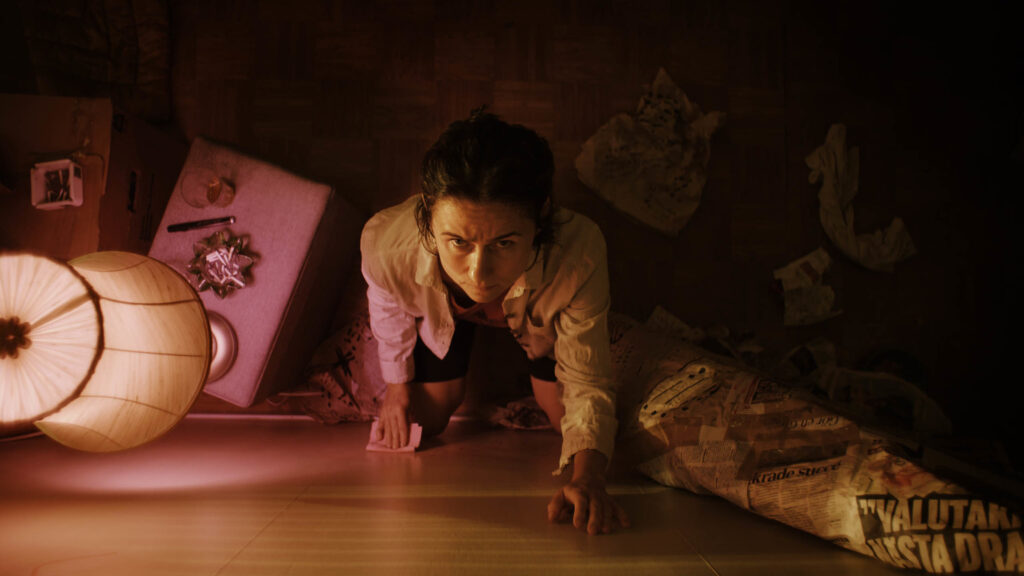The Midnight section of the Sundance Film Festival has produced some notable hits in the last few years, including “The Babadook,” “Relic,” and “Hereditary.” Looking over the schedule for the virtual edition of the 2021 Sundance Film Festival, I was concerned that the Midnight section this year felt the thinnest, unlikely to produce such a smash hit. There will be great horror movies in 2021, but it doesn’t feel like we’ll get one out of Sundance. (The most acclaimed is probably “Censor,” a film I liked a little less than Nick Allen but would probably agree is the best of this year’s program.)
The better of the two marginally successful genre flicks I caught late at night on my couch this year comes in the form of Frida Kempff’s somewhat effective “Knocking,” a film that recalls great apartment horror films like Roman Polanski’s “Repulsion” in its examination of fractured sanity.
Cecilia Milocco stars in what is essentially a one-woman show as Molly, a woman who is suffering the trauma of a horrible loss when she moves into a new apartment. Alone all the time with her grief, she starts to fracture further when she hears a knocking sound from the apartment above. She investigates and asks her neighbors, who all look at her like she’s crazy (and, of course, they’re all men), but the knocking intensifies and is joined by other unsettling sounds. Is someone trapped? Or is Molly going crazy?
It’s hard not to feel like “Knocking” is an effective short film stretched past its breaking point even at only 78 minutes, despite a strong central performance and sweaty sense of existential dread. Who hasn’t felt like there was something knocking at the back of their emotions at one point or another, probably more than ever in the last year? Milocco and Kempf smartly focus their storytelling on doubt as Molly herself starts to wonder if she’s going crazy or being gaslit. After all, the neighbors who claim not to hear the knocking are all men. And then a woman seems to be fleeing the building one night and is brought back in? What is going on?
I wanted “Knocking” to get more formally ambitious and reflect Molly’s tension and possible mental state in its visual language too, but there’s a sweaty claustrophobia to this film that’s effective, especially for those who haven’t left their apartment in a year.

A much different kind of horror unfolds in James Ashcroft’s brutal “Coming Home in the Dark,” a film that recalls other Sundance waking nightmares like 2017’s “Killing Ground.” It’s one of those horror movies that seeks to investigate not the supernatural or unknowable but the true evil in the hearts of men, even those who have convinced themselves they’re good.
A schoolteacher nicknamed Hoagie (Erik Thomson) is on a day trip with his family when they run into two drifters named Mandrake (Daniel Gillies) and Tubs (Matthias Luafutu). After a few very effective scenes in which the threat presented by this pair isn’t completely clear, the men send the family into the most violent day of their lives, and it’s not long after that Hoagie realizes that their arrival may not have been coincidental, and he’s forced to come to terms with some of his actions from the past.
Some of “Coming Home in the Dark” plays like stylish, hollow brutality, but the film’s biggest problem is one it shares with “Knocking” in that it can’t sustain for its running time, getting less interesting as it should be building to its climax. Ashcroft fills the space between major events and character revelations with monologues by the evil Mandrake, who is effectively menacing as played by Gillies but also a bit cartoonish in the way he’s used here. And Ashcroft can’t land the more serious themes about past sins and vengeance, unsure of what he’s saying about either. By the end, “Coming Home in the Dark” feels like a genre exercise with some impressive bursts of filmmaking and performance that bode well for whatever Ashcroft does next, but it’s an all-night joy ride from Hell that doesn’t end up at an interesting destination.












